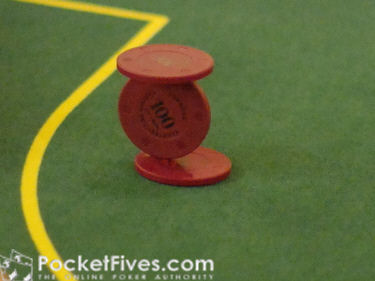Heads-Up Poker: How it Made Me Better

 Although I got my start online, a vast majority of my play has been live poker. Other than in tournaments, I think I have only played live poker heads-up on one occasion, and never really sought out heads-up games online. However, I recently ended up playing a decent amount of heads-up $5/$10 cash games online.
Although I got my start online, a vast majority of my play has been live poker. Other than in tournaments, I think I have only played live poker heads-up on one occasion, and never really sought out heads-up games online. However, I recently ended up playing a decent amount of heads-up $5/$10 cash games online.
I played heads-up mostly because there was nobody else that wanted to play those stakes and I was able to take advantage of the opportunity to improve my game and put myself in a good spot at the same time. Learning any new variation of poker will always get you out of your comfort zone and force you to expand your horizons, but playing heads-up really reinforced and cemented something in my mind that I had known on some level from early on.
When you play full ring, often the correct play, especially in the looser live games I frequent, is to be patient and wait for premium starting hands. When it takes a while for those hands to come along, we often find ourselves emotionally attached to them because they look attractive. Whether it is A-Q suited or pocket aces, we have waited forever to get a hand, and when we end up in a spot where that hand isn’t really all that strong anymore, we are emotionally attached to it and have trouble letting it go.
In heads-up play where ranges are exceptionally wide, you are playing all sorts of hands, and the value of each one has very little to do with what it looked like pre-flop.
 Everyone has heard the old saying, “With aces, you either win a small pot or lose a big one.” In deep-stacked heads-up play, you are forced to gain a perspective on hand strength that is harder to acquire when playing full ring games. Obviously, being able to more accurately assess the value and strength of your hand will correlate to your bottom line, and between adding PLO8 to my repertoire and playing Heads-Up No Limit Hold’em, I quickly started looking at hands differently.
Everyone has heard the old saying, “With aces, you either win a small pot or lose a big one.” In deep-stacked heads-up play, you are forced to gain a perspective on hand strength that is harder to acquire when playing full ring games. Obviously, being able to more accurately assess the value and strength of your hand will correlate to your bottom line, and between adding PLO8 to my repertoire and playing Heads-Up No Limit Hold’em, I quickly started looking at hands differently.
The way I view hands now makes me look back at many of the mistakes I was making before. I was overvaluing some hands and undervaluing others. Had I stayed in my comfort zone of Full Ring No Limit Hold’em, I would still be looking at hands like I was a few years ago, losing a lot of value, and definitely giving away bets with hands that I can now easily get away from.
There are a lot of ways that playing heads-up can improve your game, but for me the most obvious was how it changed my personal view of hand strength. Now when I sit down and play, I rarely feel emotionally attached to any particular starting hand. I am able to better assess situations without the starting hand having an inordinately large role in my decisions.
 Doing that not only helps you play better in each individual hand, but also keeps you in a better mental state where frustration and tilt are much less likely to slip in. When you get so attached to A-A that you call when a neutral analysis of the situation would dictate that you fold, you not only lose the hand, but you also find yourself in the types of situations that commonly lead to tilt and continued bad play.
Doing that not only helps you play better in each individual hand, but also keeps you in a better mental state where frustration and tilt are much less likely to slip in. When you get so attached to A-A that you call when a neutral analysis of the situation would dictate that you fold, you not only lose the hand, but you also find yourself in the types of situations that commonly lead to tilt and continued bad play.
If you have never given heads-up poker a shot, you should. If you can’t get much play in heads-up, then start thinking more critically about hand values and actively working to not let yourself get attached to hands. The more analytical and less emotional you are while playing, the better you will end up in the long-run.
Court Harrington has worked on the business side of the poker industry in roles including tournament reporting for PocketFives, radio hosting for PokerRoad Radio, coaching for the WSOP Academy, and a variety of behind-the-scenes responsibilities. He also plays in cash games and tournaments. Harrington is currently doing consulting work and exploring business opportunities outside of the poker industry. You can contact him at PokerRoadCourt@gmail.com.




